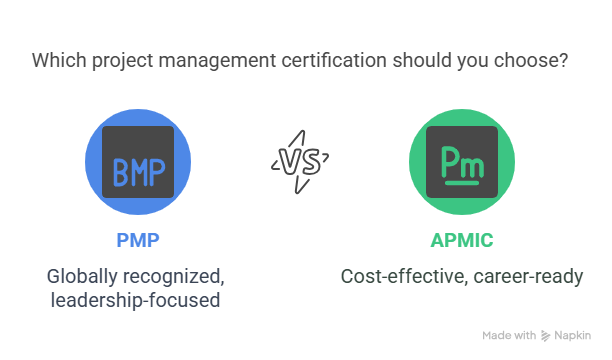Project Management Certification NYU vs Project Management Certification USF: Which Is Better?
Choosing between NYU and USF for a project management certification is more than a geographic decision. It’s about instructional depth, employer perception, learning formats, tool integration, and ROI. Both universities offer recognized certifications, but their structure, delivery, and outcomes differ—and those differences can define your early career trajectory or leadership advancement.
In this guide, we break down NYU vs USF across 2025 metrics: curriculum content, project software emphasis, post-completion recognition, and value alignment with APMIC’s advanced frameworks. Whether you're aiming for a hybrid Agile certification, PMI-aligned education, or a leadership-focused project track, this comparison lays out the real differentiators.
Curriculum Structure and Credential Alignment
Both programs offer continuing education certificates, not degrees. However, NYU’s School of Professional Studies leans toward corporate leadership frameworks with an emphasis on Agile + predictive duality. In contrast, USF’s Office of Corporate Training takes a technical-execution focus with fewer hours—but faster turnaround.
NYU's curriculum aligns closely with PMI-PMP frameworks, integrating Agile artifacts and hybrid strategies. USF includes basic PMP principles but lacks direct RACI, Monte Carlo, or procurement cycle modules.
| Category | NYU Certification | USF Certification |
|---|---|---|
| Delivery Format | Live online + asynchronous | Fully online, self-paced |
| Duration | 6–9 months | 3–4 months |
| PMI Alignment | PMP + Agile certified faculty | CAPM and PMP eligible |
| Tools Covered | MS Project, Jira, Trello | MS Project only |
| Recommended For | Mid-career PMs, Agile leads | Beginners, team coordinators |
Programs like NYU reflect advanced scheduling and quality control concepts more fully—valuable for high-accountability roles.
Career Recognition and Hiring Value
Employers recognize NYU as a leadership-tier certification, especially in Northeast U.S. regions where NYU has strong alumni placement. The curriculum includes Agile project management capstones that simulate hybrid sprint/waterfall cycles—mirroring real hiring assessments for mid-tier project managers.
USF is recognized throughout the South and Midwest but more often serves as a stepping stone to PMP or APMIC certification. It builds foundational familiarity with planning terminology, RACI matrices, and budgeting language, but not deep tool mastery.
Which matters more when choosing a certification?
Thanks for submitting your answer.
Which One Is Better for APMIC-Track Learners?
APMIC’s 542-lesson certification assumes familiarity with Agile vs predictive tension, team chartering, and risk prioritization under constraints. NYU’s course builds toward this with layered sprint-based modules. USF’s approach is suitable if paired with additional certification—especially for learners who first explore specializations or free training before enrolling in advanced tiers.
If planning to transition into APMIC’s advanced program, NYU gives a stronger curriculum bridge—while USF works well for affordability and speed, especially if followed by further upskilling in CPM methodologies and procurement logic.
Final Program Comparison
| Feature | NYU | USF |
|---|---|---|
| Project Tool Depth | Jira, risk modeling, velocity charts | Basic MS Project and Gantt |
| Agile Integration | Fully blended + simulations | Minimal hybrid logic |
| Instructor Backgrounds | Industry PMPs, Agile coaches | Corporate trainers, CAPM certified |
| Exam Prep Included | Yes (PMP and APMIC aligned) | CAPM focused only |
| Ideal Learner | Ready for APMIC advanced entry | Entry-level PMs and coordinators |
Frequently Asked Questions
-
No, but both satisfy PMP’s 35-hour education requirement. NYU prepares you better for the situational application PMP prefers.
-
NYU, especially in enterprise-level PMO roles and agencies using Agile/Predictive hybrids.
-
If your goal is a long-term project management leadership path—yes. It aligns well with team-building methodology and Six Sigma planning.
-
Not directly. It’s a foundational certification—ideal for pairing with self-paced programs or mentorship.
-
NYU, due to depth in agile velocity tracking, RACI planning, and risk registers—all critical for advanced project roles.


